
Literatura Mexicana
Scope & Guideline
Illuminating the Voices of Mexican Literary Discourse
Introduction
Aims and Scopes
- Mexican Literary Studies:
The journal focuses on a wide array of topics within Mexican literature, including historical analysis, thematic explorations, and critical interpretations of works from various periods and genres. - Cultural and Historical Contexts:
It emphasizes the interplay between literature and cultural movements, historical events, and socio-political issues, providing a rich context for understanding literary texts. - Interdisciplinary Approaches:
The journal encourages interdisciplinary research, integrating perspectives from history, sociology, anthropology, and cultural studies to enhance literary analysis. - Focus on Marginalized Voices:
There is a consistent interest in exploring works by underrepresented authors, including indigenous writers and those from minority communities, thereby enriching the discourse around Mexican literature. - Theoretical Frameworks:
The journal employs various literary theories, including postcolonialism, feminism, and decoloniality, to critically engage with texts and expand the boundaries of literary criticism.
Trending and Emerging
- Decolonial and Indigenous Perspectives:
There is an increasing emphasis on indigenous literature and decolonial approaches, reflecting a growing recognition of marginalized voices and the importance of cultural reclamation. - Literature and Social Justice:
Recent publications explore the intersection of literature with social movements, particularly those addressing issues of violence, migration, and identity, demonstrating a commitment to literature as a vehicle for social critique. - Intertextuality and Adaptation:
A rising interest in intertextuality and the adaptation of literary works across different media suggests a trend towards examining how texts converse with one another and their cultural contexts. - Feminist and Gender Studies:
An emerging focus on feminist narratives and the exploration of gender fluidity in literature indicates a progressive engagement with contemporary gender issues within Mexican literary discourse. - Global and Transnational Perspectives:
There is a notable trend towards examining Mexican literature within a global context, exploring transnational influences and the diasporic experiences of Mexican authors.
Declining or Waning
- Traditional Literary Canon:
There is a noticeable decrease in the analysis of canonical texts from the 19th and early 20th centuries, suggesting a shift towards more contemporary and diverse literary voices. - Focus on Purely Literary Analysis:
The journal appears to be moving away from purely formalist or textual analyses, favoring instead interdisciplinary approaches that incorporate historical and cultural contexts. - Colonial Literature Studies:
Research centered on colonial literature has diminished, possibly indicating a broader focus on postcolonial and decolonial perspectives that prioritize contemporary indigenous narratives. - Gender Studies in Isolation:
While gender studies remain important, there is a decline in works that approach gender issues in isolation from other intersecting factors such as ethnicity and class, reflecting a more integrated approach in recent publications.
Similar Journals
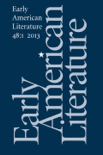
EARLY AMERICAN LITERATURE
Fostering Insight into America's Literary BeginningsEARLY AMERICAN LITERATURE, published by the University of North Carolina Press, stands as a pivotal journal in the field of American literary studies. With an ISSN of 0012-8163 and E-ISSN of 1534-147X, this journal invites scholarly discourse and analysis of literary works from the early American period, effectively bridging historical context and contemporary literary theory. The journal has maintained a consistent publication history since 1973, with significant converged years, providing essential insights for researchers and students alike. Ranked Q3 in Literature and Literary Theory with an impressive Scopus rank placing it in the 66th percentile, EARLY AMERICAN LITERATURE remains an essential resource for exploring the intricacies of early American texts and their implications. Although not an open-access journal, its contributions are invaluable for anyone engaging with this rich literary tradition, fostering a deeper understanding of America's cultural and literary heritage.
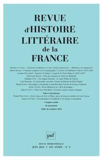
REVUE D HISTOIRE LITTERAIRE DE LA FRANCE
Advancing Understanding of Historical Literary MovementsREVUE D'HISTOIRE LITTERAIRE DE LA FRANCE, published by Classiques Garnier, is a distinguished academic journal dedicated to the exploration and analysis of French literary history and theory. With an ISSN of 0035-2411 and an E-ISSN of 2105-2689, this journal serves as an essential resource for researchers, professionals, and students in the fields of literature and the humanities. Though it does not currently offer open access, its rigorous scholarship contributes significantly to the understanding of historical literary movements and their cultural contexts. Despite its discontinuation in Scopus after 2016, the journal has a notable academic pedigree, providing critical perspectives on literature from the past to the contemporary era. Situated at 6 Rue de la Sorbonne, Paris 75005, France, the journal aims to enrich the discourse surrounding literary theory and history, highlighting its enduring relevance in today's scholarly landscape.

Escritura e Imagen
Exploring the Fusion of Words and VisualsEscritura e Imagen is a distinguished academic journal published by UNIV COMPLUTENSE MADRID, SERVICIO PUBLICACIONES, focusing on the dynamic interplay of literature, visual arts, and philosophy. With its ISSN 1885-5687 and E-ISSN 1988-2416, this journal has rapidly emerged as a vital resource in the fields of Arts and Humanities, particularly excelling in Literature and Literary Theory where it ranks in the top Q1 category. Operating from Spain, it provides a platform for innovative research and discourse, bridging traditional boundaries of artistic expression. Furthermore, it holds impressive Scopus rankings, with notable performance across various categories, reflecting its commitment to scholarly excellence. Although currently not open access, the journal offers nuanced insights and critical perspectives essential for researchers, professionals, and students who wish to delve into contemporary cultural studies and interdisciplinary dialogue.

World Literature Studies
Navigating the Landscape of Global Literary ScholarshipWorld Literature Studies is a leading academic journal published by the Institute of World Literature at the Slovak Academy of Sciences, dedicated to advancing the field of literary studies. With an ISSN of 1337-9275 and an E-ISSN of 1337-9690, this journal has established itself as a prominent platform for scholarly research and discourse, earning a prestigious Q1 ranking in the Literature and Literary Theory category as of 2023, placing it in the top 25% of journals in its field according to Scopus metrics. Operating from Slovakia, the journal caters to a global audience, highlighting diverse perspectives in world literature and fostering interdisciplinary collaboration. Though it currently offers no Open Access option, it maintains a rigorous peer-review process that ensures the quality and integrity of published works. Researchers, students, and literary professionals alike will find the journal's comprehensive articles and critical analyses essential for staying informed about the latest developments and trends in literature and literary theory.
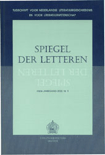
SPIEGEL DER LETTEREN
Unveiling the Rich Tapestry of Literary DiscourseWelcome to SPIEGEL DER LETTEREN, a distinguished journal published by PEETERS in Belgium, with an impressive Q1 ranking in Literature and Literary Theory. Since its inception in 1996, this journal has been at the forefront of literary scholarship, engaging researchers, professionals, and students in profound discussions and analysis of literary texts, theories, and cultural contexts. Although it does not currently offer open access, its rigorous editorial standards ensure that each published work contributes significantly to the field, promoting the advancement of knowledge and understanding in literature. With an established reputation, SPIEGEL DER LETTEREN serves as a vital resource for those seeking to explore the nuances of literary studies, supported by a diverse range of articles that reflect both contemporary and historical perspectives.

TWENTIETH CENTURY LITERATURE
Charting New Territories in 20th Century LiteratureTWENTIETH CENTURY LITERATURE is a renowned journal published by Hofstra University Press, dedicated to the exploration and analysis of literature and literary theory from the twentieth century. With a focus on both established and emerging voices in the field, this journal serves as an essential resource for researchers, professionals, and students who seek to deepen their understanding of significant literary movements and trends. The journal holds an impressive Q2 category ranking in Literature and Literary Theory as of 2023, showcasing its impact and relevance in the academic community. Though not an open access journal, it provides valuable insights and scholarly discussions that contribute to ongoing debates in literature studies. Covering a converged period from 2002 to 2014 and continuing from 2016 to 2024, TWENTIETH CENTURY LITERATURE positions itself as a pivotal platform for thought-provoking literature critique and scholarly inquiry, making it an indispensable addition to any academic library or personal collection.
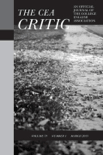
CEA CRITIC
Advancing insights in education and literature.CEA CRITIC, published by Johns Hopkins University Press, is a reputable journal that contributes significantly to the fields of Education, Literature, and Literary Theory. With an ISSN of 0007-8069 and E-ISSN of 2327-5898, the journal has been a vital platform for scholarly discourse since its inception in 2002, reinforcing its commitment to advancing knowledge and critical analysis in literature and education through to 2024. Though currently indicated in Q4 quartile rankings, CEA CRITIC welcomes submissions that challenge established norms and explore innovative perspectives, making it an essential resource for researchers, educators, and students alike. As an important outlet for original research and in-depth reviews, this journal strives to foster a vibrant academic community by offering insights that resonate both within and beyond the classroom. Engage with CEA CRITIC to share your scholarly work and contribute to this evolving dialogue in contemporary education and literary studies.
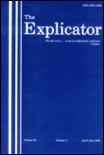
EXPLICATOR
Advancing Critical Discourse in HumanitiesEXPLICATOR is a distinguished academic journal dedicated to the fields of Education and Literature, published by Routledge Journals, Taylor & Francis Ltd. Established in 1975, this journal has carved out a niche for itself by providing a platform for critical essays that explore diverse aspects of literary works, educational theory, and practice. With an ISSN of 0014-4940 and an E-ISSN of 1939-926X, EXPLICATOR has earned its place in the academic community, reflected in its Q4 ranking in Education and Q3 in Literature and Literary Theory as of 2023. The journal has made significant contributions to the discourse in its domains, although it presents challenges given its current Scopus rankings, with percentile standings in the 24th and the 2nd for respective categories. By bridging theoretical perspectives with practical applications, EXPLICATOR invites researchers, educators, and students to engage with its offerings, fostering a rich exchange of ideas and advancing understanding within these vital disciplines. Although it does not currently offer an Open Access option, articles are accessible through institutional subscriptions, ensuring a broad dissemination of knowledge in the humanities and social sciences.
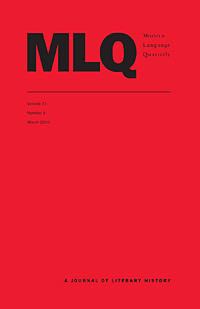
MODERN LANGUAGE QUARTERLY
Illuminating the Intersection of Language and Society.MODERN LANGUAGE QUARTERLY, published by DUKE UNIVERSITY PRESS, stands as a premier journal in the field of Literature and Literary Theory, recognized for its intellectual rigor and scholarly contributions. With an impressive Scopus ranking of #156 out of 1106 in its category, the journal showcases an 85th percentile standing, indicating its significant impact within the academic community. The journal, with ISSN 0026-7929, focuses on critical analysis, literary theory, and the intersection of language and culture, making it an essential resource for researchers, professionals, and graduate students alike. As it converges from 1996 to 2024, MODERN LANGUAGE QUARTERLY continues to uphold its tradition of excellence in literary scholarship, contributing to the advancement of knowledge and fostering a deeper understanding of literature's role in society. With its Q1 ranking in 2023, this journal represents the forefront of literary studies, providing a vibrant forum for the exchange of ideas and innovative research in the humanities.

MESTER
Advancing Cultural Discourse and Literary InsightsMESTER is a distinguished academic journal published by the UCLA College of Humanities, known for its commitment to advancing research in the fields of Cultural Studies, Linguistics and Language, and Literature and Literary Theory. With an ISSN of 0160-2764, this journal serves as a vital platform for scholars and professionals to disseminate innovative research and critical perspectives from diverse theoretical frameworks and cultural contexts. Although currently operating without an Open Access model, MESTER continues to uphold a rigorous peer-review process, ensuring that published articles maintain high academic standards. Recognized for its selective focus, MESTER holds a Q4 categorization in Cultural Studies and Linguistics, and Q3 in Literature and Literary Theory, situating it as a relevant, if emerging, voice within these disciplines. Housed within the significant repository of knowledge at UCLA, the journal beckons researchers, students, and practitioners to engage with its contributions to the humanities and build upon its foundations in cultural discourse.